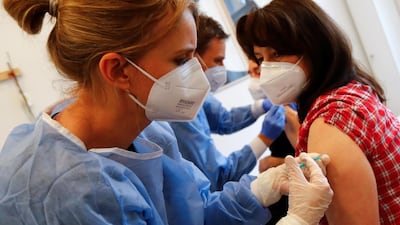The Delta variant now accounts for half of the new coronavirus infections in Germany, reports suggest, as the mutation spreads across Europe.
Public health chief Lothar Wieler said genome analysis showed that Delta infections made up 36 per cent of the total in the week ending June 20.
Given the proliferation of the variant, the share of Delta cases in Germany was likely to have reached 50 per cent in the last week of June, he was quoted as saying.
Mr Wieler, the head of the Robert Koch national public health institute, said the strain was likely to become dominant by the autumn.
Concern over Delta prompted the German government to push for tougher restrictions on travel from the UK and Portugal, where Delta is the dominant strain.
Germany's move to impose a 14-day quarantine on travellers from Portugal and ban most arrivals from the country led to a rebuke from the European Commission.
EU members agreed last month to pull an “emergency brake” on countries with variants of concern, but Brussels said states must co-ordinate their precautions.
“The German measures do not seem fully aligned with it,” said EC spokesman Christian Wigand.
“While we must stand ready to reintroduce public health measures if needed, including making use of the emergency brake, co-ordination remains essential.”
Rift over travel
Germany’s call for harmonised restrictions on Britain failed to convince tourism-reliant countries such as Portugal and Spain.
The rules laid down by Berlin mean that all travellers from the UK must quarantine for 14 days and cannot take tests to avoid or shorten the isolation period.
But UK holidaymakers can still visit Spanish islands such as Mallorca and Ibiza by showing a negative PCR test or proof of full vaccination.
The large crowds at Euro 2020 football matches, especially in England, are another cause of concern in Germany.
Politicians said they were alarmed by the 45,000 crowd in London's Wembley Stadium to watch the England v Germany match on Tuesday.
While Britain plans to raise the attendance to 60,000 for the final, or two-thirds of Wembley’s capacity, crowds in Germany are capped at 20 per cent.
“England were the deserved winners and Delta was also a winner,” German Green MP and former minister Renate Kuenast said after the game.

Studies showed that available vaccines are highly effective at preventing severe illness with the Delta variant but that two doses are essential.
Germany has given a first dose to 54 per cent of its population and 36 per cent is fully vaccinated.
Health Minister Jens Spahn celebrated on Wednesday after Germany’s share of partially-vaccinated people overtook that of the US.
Germany started slowly but is now giving about 500,000 vaccine shots per day.
“The US started quickly, but today Germany is level for the first time in first vaccinations,” Mr Spahn said.
“That shows that the vaccination campaign requires a long-term approach. We will keep the pace of vaccinations high.”


